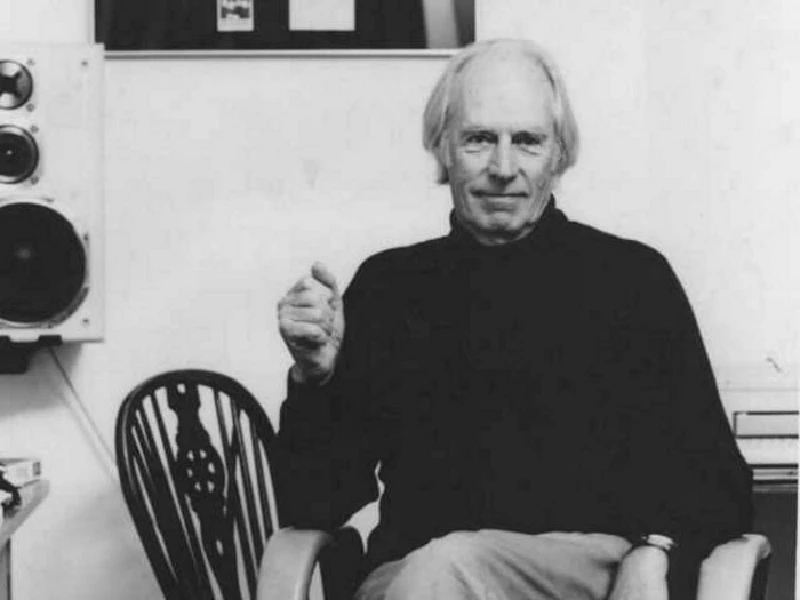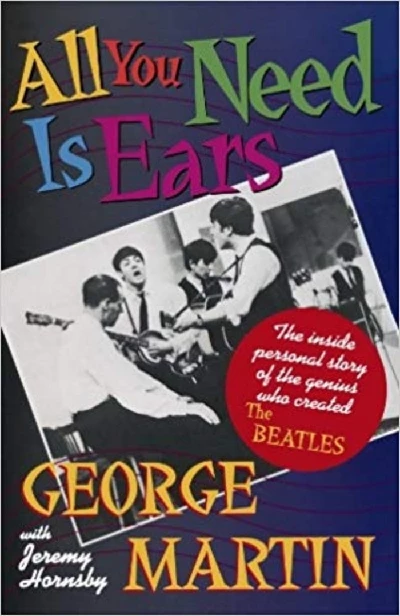George Martin - 1926-2016
by Nick Dent-Robinson
published: 10 / 4 / 2016

intro
Nick Dent-Robinson reflects on the career and life of legendary Beatles producer George Martin, who died in March
George Martin was a modest man. I remember his very genuine insistence when I met him just a few years ago that The Beatles were so good that any producer could have recorded them and they'd have still been the same mega-success. Yet they would never have sounded the same. Who else in the pop/rock world of the early 1960s would have had George Martin's technical skills, classical music expertise and imagination - not to mention great diplomacy and huge patience - that combined to enable The Beatles to create the music they were ultimately capable of? When the Beatles first met him, George Martin was a 36 year-old World War II veteran and his knowledge of classical music, jazz, swing, country dance music and comedy records was to prove invaluable. In those days who else would have put a string quartet behind McCartney's 'Yesterday' or a mix of violins, violas and cellos on 'Eleanor Rigby'? Or make a piccolo trumpet the key feature of 'Penny Lane' whilst introducing a Victorian steam organ on 'Sgt. Pepper's' 'Mr. Kite'? Those innovations were all firsts. George Martin was a brilliant arranger, as well as a usually uncredited pianist and harmonium (plus occasional woodwind) player on over thirty Beatles tracks. He featured as an instrumentalist on John Lennon's 'In My Life', for example. Perhaps, though, George Martin's greatest role was as a mentor and musical teacher to the four Beatles. He showed them how to maximise the quite extraordinary musical talent they had. Though, as he was at pains to stress when I talked to him, they also brought out the best, professionally, in him. He had almost rejected the Beatles, though. His first reaction to all the pressure and hype from the band's ambitious manager Brian Epstein was fairly negative. “They sounded a rough lot,” George remembered. “But when I actually met them they had an energy, a raw drive and intelligence that was different – and I could see they had potential.” Initially the Beatles thought George Martin was a bit too smooth, urbane, well-bred, like a solicitor or posh accountant - someone who'd had life easy. They couldn't have been more wrong. George Martin was born in 1926 the son of a carpenter in Holloway, North London, and for years his mother scrubbed floors to feed the family when George's father was out of work during the Depression. “We were extremely poor,” George recalled. “But we did have an old piano and, as far back as I remember, I used to play it. I had natural ability and perfect pitch which I can't explain and luckily someone heard me play when I was ten and somehow music lessons were arranged.” George Martin never looked back. By sixteen he was running a school dance band, and on joining the Fleet Air Arm as aircrew during the Second World War he found time to play in various bands. He became a junior officer, too - and learned to speak with the cultivated, public school accent which later impressed the Beatles. After the war he was accepted by the Guildhall School of Music and later became a freelance musician playing the oboe in various symphony orchestras before joining EMI as 'artists and repertoire' man at Parlophone, their smallest label. He was soon a producer and recorded everything - including 'The Temperance Seven' trad jazz records, Peter Ustinov's 'Mock Mozart', comedy numbers with Peter Sellers and Sophia Loren and Spike Milligan (at whose wedding George Martin was best man). But, before the Beatles, rock music was not one of George Martin's areas. “It was just not a genre I knew about, it was quite foreign to me,” George explained to me. “I had been too busy with my wife, my family and my cultural interests were just elsewhere.” After 'Please Please Me', however, the Beatles' first huge hit, everything was to change and George Martin enthusiastically worked with the rest of Brian Epstein's stable of artists – from Cilla Black to Gerry & The Pacemakers (to whom he suggested they record the song from 'Carousel', 'You'll Never Walk Alone'), producing a whole series of major successes. In later years George Martin was in huge demand as a producer. And he wrote film and classical music and was involved in various television documentaries - often about the Beatles. Like the four Beatles themselves, despite all his subsequent achievements, George Martin could never quite escape his greatest years which were undoubtedly in the Sixties. When I met him (through the singer-songwriter Sam Brown who is a friend of George Martin's son Giles, who is also a record producer), George, now quite deaf, was happy to just enjoy his beautiful 17th-century Oxfordshire home where he and his wife Judy have created a stunning garden. He was a charming, generous and kind man who was genuinely unassuming. But there's no question that, without his foresight, brilliance and influence, the story of the Beatles and of rock music for the last half century, would have been a very different one.
Band Links:-
http://www.georgemartinmusic.comhttps://en.wikipedia.org/wiki/George_Martin
features |
|
All You Need is Ears (2019) |

|
| Lisa Torem in 'Raging Pages' finds that George Martin’s memoir 'All You Need is Ears' remains as timeless as ever and is essential reading for all musicians. |
most viewed articles
current edition
Carl Ewens - David Bowie 1964 to 1982 On Track: Every Album, Every SongArmory Show - Interview with Richard Jobson
Colin Blunstone - Thalia Hall, Chicago, 16/7/2025
John McKay - Interview
Visor Fest - Valencia, Spain, 26/9/2025...27/9/2025
Bathers - Photoscapes 1
Billie Eilish - O2 Arena, London, 10/7/2025
Loft - Interview
Robert Forster - Interview
Sir Tim Rice - Interview
previous editions
Heavenly - P.U.N.K. Girl EPManic Street Preachers - (Gig of a Lifetime) Millennium Stadium, Cardiff, December 1999
Beautiful South - Ten Songs That Made Me Love...
Oasis - Oasis, Earl's Court, London, 1995
Prolapse - Interview
Peter Perrett - In Dreams Begin Responsibilities Interview Part One
Coldplay - Wembley Arena. London, 16/8/2022
Boomtown Rats - Ten Songs That Made Me Love....
Trudie Myerscough-Harris - Interview
Pixies - Ten Songs That Made Me Love...
most viewed reviews
current edition
Davey Woodward - Mumbo in the JumboSick Man of Europe - The Sick Man of Europe
Amy Macdonald - Is This What You've Been Waiting For?
Lucy Spraggan - Other Sides of the Moon
Phew, Erika Kobayashi,, Dieter Moebius - Radium Girls
Suzanne Vega - Flying With Angels
Alice Cooper - The Revenge of Alice Cooper
Bush - I Beat Loneliness
Blueboy - 2
Cynthia Erivo - I Forgive You
Pennyblackmusic Regular Contributors
Adrian Janes
Amanda J. Window
Andrew Twambley
Anthony Dhanendran
Benjamin Howarth
Cila Warncke
Daniel Cressey
Darren Aston
Dastardly
Dave Goodwin
Denzil Watson
Dominic B. Simpson
Eoghan Lyng
Fiona Hutchings
Harry Sherriff
Helen Tipping
Jamie Rowland
John Clarkson
Julie Cruickshank
Kimberly Bright
Lisa Torem
Maarten Schiethart